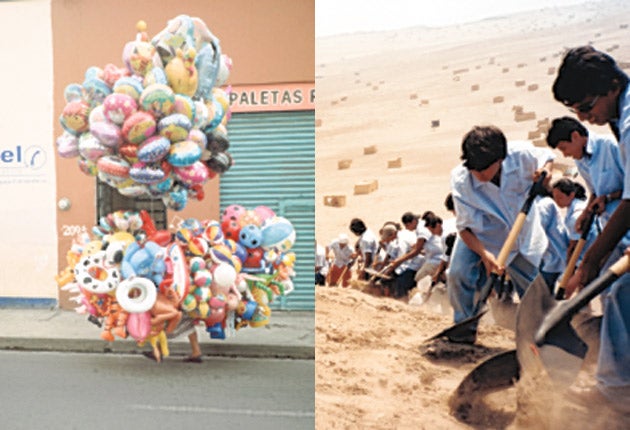Francis Alÿs: A Story of Deception, Tate Modern, London

You are walking down a long road between two fields. The road never seems to change, but you keep glimpsing something, close by, in the distance. Is there water on the road ahead? A town? The future flickers and shimmers, you are almost there, on the brink of something, then it vanishes into thin air: a mirage. This is the rather beautiful 16mm film, A Story of Deception (2003-6), filmed in Patagonia, that opens (and gives name to) Francis Alÿs's current survey show at Tate Modern, exploring the crossovers between poetics and politics. The never-reachable moment, a continual glimmer of hope, a pointless struggle – these are the motifs of this brilliant, yet slippery, exhibition. In other films here children build sandcastles to knock them down, the artist pushes a large block of ice around Mexico City until it melts to nothing, or dribbles a line of green paint from a leaky can along the "green line" – the 1948 armistice border between Israel and neighbouring countries. Everything teeters between being depressingly pointless and joyfully, wonderfully so.
Though Alÿs is Belgian, and studied as an architect, it is when he moved to Mexico City, where he now lives, that he became an artist. And it's fair to say that Mexico is central to the artist's work and concerns. The idea that the country constantly appears to take two steps forward, two steps back, continually shackled to vicious circles of crime or poverty, is a matter of major concern to Alÿs. This is perhaps best conveyed in Rehearsal I (1999-2001), a film showing a little red VW Beetle climbing up a hill . The soundtrack is a brass band rehearsal, silly and pompous, and the driver, who is also listening to the same track, has been told to take his foot off the gas every time the band pauses. Down the little car rolls to the bottom. Until, once more, jolly and optimistic the band and the car start over again. One word of complaint: in another film, modernity is conceived of as a rehearsing stripper, putting clothes back on before she removes them, but the meeting of an analogy with a real person (a hired stripper playing the eternal "tease" of Latin American fulfilment and modernity) is the only awkward note in an otherwise delicately paced and thoughtful exhibition. Videos are interspersed with archives, sketches, and dreamy, fairy-tale paintings of tiny Arcadian figures playing mysterious games with ladders, maypoles and dogs – more happy futile games and double binds.
When Faith Moves Mountains (2002), represented here as a film, is a truly great piece of work, and it is perhaps less grandiose than it might appear. Alÿs convinced hundreds of students and other volunteers in Lima to attempt to move an immense sand dune a few centimetres, in unison, with one shovel each. Alÿs appears to hope that the project will become a rumour, a myth – that the people of Lima will remember their collective abilities to achieve something monumental, together. A sketchy little painting of the dune glints happily in the corner of the room: an absurd, lovely legend – something like hope.
To 5 September (020 7887 8888)
Join our commenting forum
Join thought-provoking conversations, follow other Independent readers and see their replies
Comments